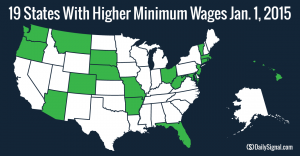Minimum Wages Rise in 19 States
< < Go Back
Nineteen states across the country raised their minimum wages on January 1, reports Melissa Quinn at the Daily Signal. While nine increases were automatic increases mandated by state law to keep up with inflation (as in Arizona, Colorado, Florida, Missouri, Montana, New Jersey, Ohio, Oregon and Washington), others were due to ballot measures and legislative action.
That minimum wages have unintended consequences on low-income, low-skilled workers has been a constant refrain of those opposed to the wage hikes, but supporters have rallied behind the wage increases as positive measures to improve the economic standing of those in low-income positions, despite evidence to the contrary. Indeed, a recent study from the University of California-San Diego found that minimum wage hikes during the last decade not only limited low-skilled Americans’ ability to achieve higher earnings, but lowered the employment-to-population ratio (the proportion of the working-age population that is employed).
The highest minimum wage among the states raising the wage this year will be Washington, D.C., when it raises its wage to $10.50 per hour in July. Until then, Washington State, with a $9.47 hourly wage, will have the highest minimum wage. Many of those calling for wage hikes had hoped to achieve a $15 hourly wage. Quinn cites research from James Sherk of the Heritage Foundation, who found that imposing a $15 per hour wage would require a typical fast food restaurant to raise its prices by 38 percent in order to handle the increased labor costs. Quinn highlights what that would mean for fast food prices:
– With a $15 minimum wage, a Big Mac meal at McDonald’s would rise from $5.69 to $7.82.
– A steak burrito bowl from Chipotle would soar from $6.65 to $9.14.
– A Wendy’s Son of a Baconator combo would cost $8.92, up from $6.49.
– A Whopper meal at Burger King would cost $8.46 with such a wage hike, up from $6.15.
Often, minimum wage supporters will argue that minimum wages have little impact on employment. But Senior Fellow Richard McKenzie addressed this claim in an NCPA study last year, explaining that employer responses to wage hikes can take a variety of forms. According to McKenzie, employers often reduce non-monetary fringe benefits in response to wage hikes, such as workplace flexibility or other amenities. The loss of these benefits, while substantial, are not reflected in official jobs figures.
More From NCPA:




